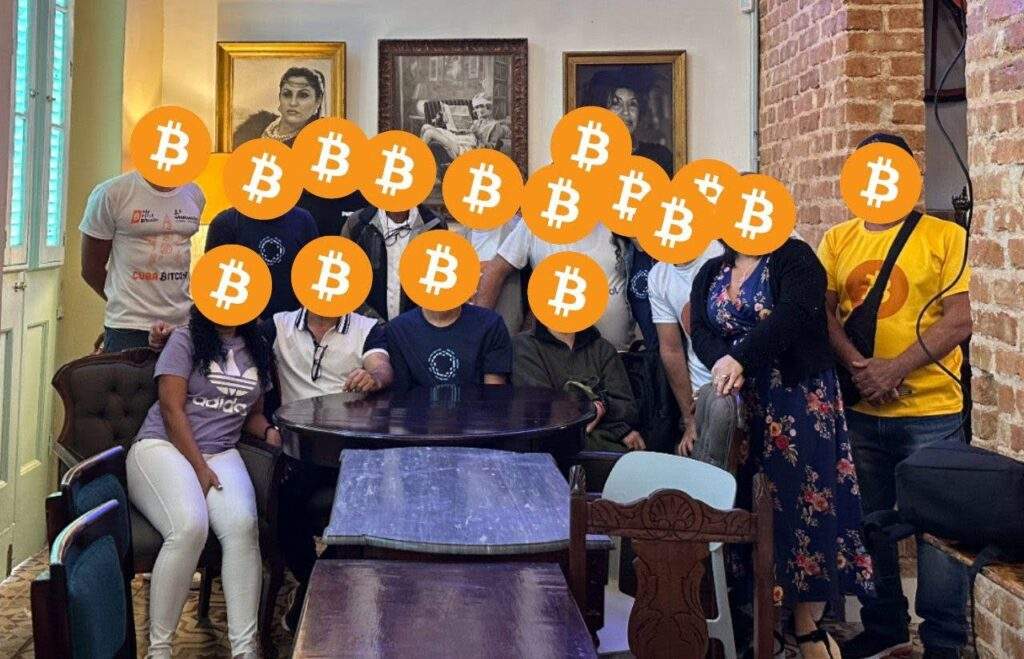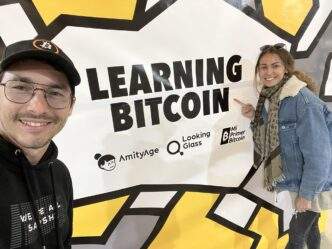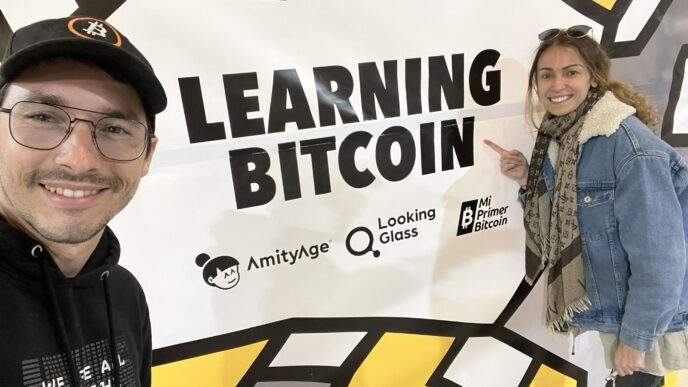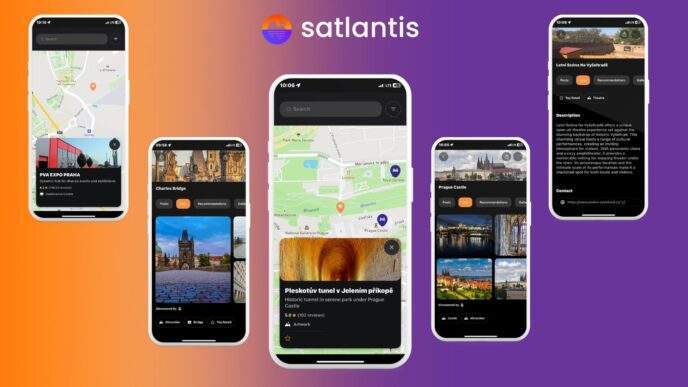In a land where the peso crumbles, blackouts stretch for 20 hours, and the state watches every transaction, a quiet revolution brews—not with guns, but with sats. Meet the founders of Cuba Bitcoin, a grassroots collective turning economic rubble into digital resilience.
Born from internet scams and OFAC sanctions, they’ve forged tools that defy hyperinflation: Lightning Network barter, offline Cashu tokens, and a community node strengthening Cuba’s tether to the global economy. Their weapon? Education. Their shield? Self-custody. Their anthem? “Bitcoin no es spéculación—es libertad.” This is the story of how Cubans are reclaiming sovereignty, one peer-to-peer trade at a time
First Steps
- What inspired the creation of the Cuba Bitcoin community, and what core values drive your work?
In 2017, internet access became available in Cuba, and with it, many people began exploring the digital world for the first time. Unfortunately, this new connectivity also brought a wave of scams, ponzi schemes, and shitcoins that affected many Cubans—partly due to a lack of financial education and limited investment opportunities in the country.
As digital currencies started gaining traction, Cubans felt the need to exchange them. However, because Cuba is a country sanctioned by OFAC, many exchange platforms and P2P services blocked access to Cuban users. To solve this, some people created Telegram groups called “VIPs,” where trades were done either P2P or through intermediaries.
These groups were not scalable, required KYC, and were often unsafe. Some platforms also emerged to automate P2P exchanges, but most still required KYC.
That’s when Cuba_LNp2p ( t.me/Cuba_lnp2p ) was born—a community centered around using the LNP2P bot ( t.me/lnp2pbot , https://lnp2pbot.com/index.es.html ) to facilitate Lightning Network trades without KYC.
This initiative not only made exchanges safer and faster, but also became a space to educate Cubans about Bitcoin and Lightning, which were rarely used before. As Cuba_LNp2p grew, we decided to create a new community focused entirely on Bitcoin education and adoption: Cuba Bitcoin (t.me/Cuba_Bitcoin , cubabitcoin.org ) was born. Our mission is clear—to promote the use of Bitcoin in Cuba and beyond, strengthen financial sovereignty, and encourage the creation of local circular economies.
- How does Bitcoin uniquely address the financial challenges faced by Cubans today?
Bitcoin offers Cubans something no other form of money ever has: access to a value that cannot be confiscated, censored, or devalued by external decisions. No one can shut us out of bitcoin, and that makes it a unique tool to face the financial exclusion we experience daily.
Cuba is practically disconnected from the global financial system. As Cuban residents, we can’t open accounts in banks that issue Visa or Mastercard, nor can we access services like PayPal, Apple Pay, Google Pay, and many others ( ). We live in a sanctioned country, and that means our geographic identity alone is enough to block us from basic financial tools.
On top of that, we face a deep internal economic crisis. In recent years, the Cuban peso (CUP) has gone from 25 CUP per 1 USD to over 370 CUP per dollar, even reaching 400 CUP in the informal market.
The result has been the massive loss of purchasing power for millions of people. Families have seen their life savings evaporate due to failed monetary policies and repeated financial lockups.
First, the government eliminated the CUC (which used to be pegged 1:1 with the dollar), then introduced the MLC, and more recently created a new form of restricted money through electronic cards called “clásicas.” Every government-issued currency eventually trends toward zero against the dollar—and even faster against bitcoin.
Bitcoin doesn’t ask questions. It doesn’t care where you’re from, your race, religion, gender, or political beliefs. It’s the only truly neutral and censorship-resistant form of money. In a Cuban context, it’s a human right.
- What milestones has Cuba Bitcoin achieved so far?
In a context where Lightning Network was practically unknown in Cuba, today the Cuba_LNp2p exchange community (t.me/cuba_lnp2p) has grown to more than 1,000 active users.
Cubans use it to exchange bitcoin and receive remittances via Lightning, paying less than 0.6% per transaction, compared to the 10%–30% lost through traditional methods. This has enabled more fair, fast, and efficient access to global money.
Education is at the heart of Cuba Bitcoin. We’ve developed and led more than six editions of different educational programs. We started by teaching My First Bitcoin’s curriculum, completing four editions (three in person and one online, with even some international participants), always adding new topics and going deeper into the material.
From that experience, we created our own Basic Cuban Bitcoin Program, with the first course held in person in Isla de la Juventud. Later, we refined the curriculum and launched Bitcoin Fácil, a new program that includes how to do safe P2P exchanges using the LNP2P bot, lessons on Nostr, BTCPay Server, and more.
We’ve also hosted two editions of Trezor Academy and organized over 20 educational meetups across the country. Altogether, we’ve graduated more than 150 people, including both Cubans and foreigners.
In terms of circular economy, when Cuba Bitcoin started, there were fewer than five businesses in Cuba accepting bitcoin. Today, more than 50 businesses are listed on BTC Map.
Additionally, La Isla BTC 24 was born—a local circular economy based in Isla de la Juventud. We’ve also helped over five Cuban businesses adopt BTCPay Server as a sovereign tool to receive bitcoin payments directly, without intermediaries.
Faced with many restrictions on accessing Bitcoin tools and platforms, we decided to build our own community infrastructure. We started with the Cuba Bitcoin Lightning node, which helps strengthen connectivity with and from Cuba.
We created a dedicated LNbits instance that allows Cubans to have a censorship-resistant Lightning wallet—ideal for stacking sats until they’re ready to self-custody. We also launched a BTCPay Server instance where Cuban merchants can set up stores and connect them to their own node—or use the Cuba Bitcoin node via LNbits if they prefer.
Most recently, we launched a community Cashu mint , which allows Cubans to issue and use ecash tokens without needing an internet connection—crucial in a context where connectivity often fails and blackouts can last over 20 hours a day.
Finally, we’ve also helped Cubans access hardware wallets like the Blockstream Jade—something that’s typically impossible due to shipping restrictions from most providers. Thanks to these efforts, many have been able to take their first step toward secure, sovereign self-custody.

Challenges & Breakthroughs
- What are the biggest barriers to Bitcoin adoption in Cuba, and how is your team addressing them?
The biggest barriers to bitcoin adoption in Cuba are not technological only, they are deeply structural, ideological, and human.
The main barrier is the country’s harsh reality.
Cubans are limited by a state-owned telecommunications monopoly (ETECSA), which provides only 6 GB of mobile internet per month. If they want more data, they must pay prices that are unaffordable for most, often exceeding the average monthly salary of a professional. On top of that, blackouts lasting more than 20 hours have become common, making it nearly impossible to study, work, or even charge a phone.
Add to that a backdrop of hyperinflation, chronic shortages of food and medicine, and massive emigration that has torn families and communities apart. The national financial system is fragmented and outdated, and Cubans have no access to global banking services or international payment methods. There are no Visa cards, no PayPal accounts, no international transfers. Everything is blocked.
And yet — here’s the most interesting part — that same reality that acts as a barrier also serves as fertile ground. Because when there are no options, the need to innovate becomes urgent. It’s out of that need that bitcoin flourishes — not as a trend, but as a vital tool:
A way to send and receive money, to escape the weight of inflation, to rebuild economic and social networks without asking for permission.
At Cuba Bitcoin, we respond with education, community, and sovereignty:
- We teach people how to use bitcoin with limited connectivity, in a practical and secure way.
- We build our own infrastructure — independent of third parties or external approval.
- We support entrepreneurs who want to receive payments in sats and disconnect from the fiat system.
- And above all, we help people understand the why behind the technology: It’s not speculation — it’s freedom.
- Can you share a story of how Bitcoin has directly improved someone’s life in Cuba?
Yes, we have many real stories.
One of the most powerful is how bitcoin has allowed Cubans to receive remittances and support from abroad — without censorship, intermediaries, or abusive fees — something that used to be nearly impossible.
With traditional methods, people often lost up to 30% of the value through commissions, delays, and forced currency exchanges. With Bitcoin, those losses are reduced to less than 1%, and the funds arrive within minutes.
We’ve also seen how bitcoin enables entrepreneurs to sell digital services internationally, get paid in a strong currency, and bypass the global banking restrictions that prevent Cubans from using PayPal, Stripe, credit cards, or SWIFT transfers.
Many are also using bitcoin as a store of value in the face of hyperinflation. In a country where the local currency loses value week after week, being able to save in sats is a complete shift in mindset. Even small amounts allow people to start protecting the fruits of their labor and planning for the future.
Bitcoin has also helped build new communities: local businesses accepting sats as payment, people teaching each other how to self-custody their money, and collaborative projects organizing without relying on the State or banks.
It has become a tool for empowerment — especially for women, young people, and the elderly — who can learn to use it without anyone’s permission, even from a basic smartphone, and start participating in a freer economy.
This is not a future promise: bitcoin is already improving lives in Cuba. Every single day. Most importantly: it gives people a sense of having real options. And in Cuba, that’s already a form of freedom.
- How do regulations in Cuba shape your approach to Bitcoin advocacy?
There is no clear regulation on bitcoin in Cuba. It is not banned, but it is also not legally recognized or protected. This creates a legal gray area that, in a centrally controlled country like Cuba, can be just as risky as an outright ban.
The government has repressed the private sector for decades. As a result, many citizens and entrepreneurs feel fear of possible retaliation, even if there is currently no law prohibiting the use of bitcoin. Surveillance, inspections, and legal uncertainty lead many to remain silent even when they see the value in adopting this technology.
At Cuba Bitcoin, this situation has led us to take an educational, peaceful, and decentralized approach. We do not promote speculation or confrontation. We promote education as a tool for individual empowerment.
Our strategy is based on:
- Focusing our efforts on self-custody, technical understanding, and responsible use of bitcoin.
- Avoiding reliance on any legal or organizational structure that could be targeted or shut down.
- Helping every Cuban understand that bitcoin is not a crime it’s a tool.
- Remaining an open community, with no formal hierarchy or visible leaders, in order to reduce personal risk.
The lack of regulation forces us to be creative, cautious, and deeply ethical.
But it also gives us space to prove that true revolution lies in educating, sharing, and building sovereignty from the ground up.
- What tools or innovations (e.g., Lightning Network, mesh networks) are most promising for Cubans?
Bitcoin is a truly disruptive technology—one that changes the rules of the game and empowers people, even in the most difficult environments. For Cubans, discovering Bitcoin on-chain represented a paradigm shift: for the first time, we could access money that didn’t depend on the government or the banks.
However, for many users, on-chain transaction fees and 10-minute block confirmation times made it impractical as a medium of exchange for daily use. This led many to turn to faster alternatives like Litecoin (LTC), Tron (TRX), or Binance Coin (BNB), even though these lack Bitcoin’s core values of decentralization and censorship resistance.
The real revolution came with Lightning Network, which allowed us to make instant payments with near-zero fees—and best of all, without leaving the Bitcoin ecosystem. Thanks to Lightning, today we can make micropayments, send remittances, and carry out daily purchases without waiting for confirmations or paying high fees. This technology has been key to helping many Cubans trust bitcoin again as everyday money.
However, Cuba still faces major challenges: daily blackouts, high network latency, and constant internet outages. There is only one telecom provider in the country—ETECSA, a state-owned monopoly.
In this context, bitcoin—being internet money—faces a critical limitation: how do you pay when there’s no connection? And this is not just a problem for bitcoiners: when the power goes out, banking apps stop working, ATMs shut down, and there’s often no physical cash available. Commerce simply halts.
To address this, we started looking for solutions within the bitcoin ecosystem that could enable offline payments. That’s when we discovered the theory behind ecash, and specifically its implementation on Lightning: Cashu. We dove deep into the protocol, and within a week we had launched our own community-run Cashu mint.
This not only solves the problem of offline bitcoin transactions—it also minimizes trust in a third party, since the mint is operated by the community itself, and it’s also a powerful tool for enhancing privacy. Cashu is a real-world solution, built from the ground up to meet Cuba’s unique conditions—so that bitcoin remains useful even without the internet.
- If Bitcoin were a Cuban cultural symbol, what would it be and why?
If bitcoin were a Cuban cultural symbol, it would be the tocororo, Cuba’s national bird.
The tocororo is beautiful, free, and wild. But what sets it apart from any other bird is this: if you cage it, it won’t survive. It cannot bear captivity. It beats itself against the bars until it dies — because it doesn’t know how to live without freedom.
Cubans, like the tocororo, refuse to live in confinement. We’re always seeking ways — even if difficult — to escape control, surveillance, and scarcity. And in that pursuit of freedom, bitcoin emerges as a real and tangible path to reclaim sovereignty, to choose for ourselves, and to connect with the world without asking for permission.
Bitcoin is not just a technology. In Cuba, it’s a peaceful act of resistance. It’s the song of the tocororo behind the bars, reminding us that even if we were born in a cage, we were made to fly.

What’s Next?
- Are there partnerships (local or global) you’re pursuing to accelerate adoption?
Although Cuba Bitcoin has done an enormous proof of work in a chaotic and extremely difficult context, securing support or forming partnerships remains a major challenge.
All our events and classes have been completely free, carried out at the expense of the time, effort, and personal resources of our co-founders and educators. We are not an NGO — nor could we be. Independent NGOs are not allowed in Cuba. That’s why we’ve chosen to remain a grassroots community, without formal legal structure, but with a clear mission: to educate and guide people toward financial sovereignty.
Cuba is a country sanctioned by OFAC. And even though Cuba Bitcoin is not aligned with the Cuban government nor promotes communist ideology, the mere fact that we engage in grassroots bitcoin activism from within Cuba causes many individuals, companies, and even well-meaning platforms to distance themselves from us out of fear of legal repercussions in their own countries.
For example, Geyser Fund, the go-to platform for funding bitcoin projects, cannot support Cuba Bitcoin. As its own founders have told us: if they allow us to raise funds through their platform, they could face legal consequences or even prison.
Despite this, we’ve received small but meaningful donations from members of the international bitcoin community, and support from initiatives like Joe Nakamoto, Bitcoin Beach, Escuelita Bitcoin, Bitcoin Lake, and My First Bitcoin.
While the funds we’ve received are not enough to cover everything we aim to accomplish in such a difficult context, every satoshi feels like a whole bitcoin to us. We are deeply grateful to those who choose to share their resources and their love with us.
At Cuba Bitcoin, we are fully open to collaborating with any project, business, or brand that aligns with the Bitcoin maximalist values that form the backbone of our community.
We believe that Cuba Bitcoin needs the world, yes —but we also believe that the world can learn valuable lessons from what we’ve built here: bottom-up, principled, and unstoppable.
- How can the global Bitcoin community support Cuba’s grassroots Bitcoin movement?
There isn’t a single way to support us — and that’s precisely the beauty of this movement. The global bitcoin community is diverse: some excel in education, others in technical development, and others in building circular economies. All forms of support are valuable and welcome.
One of the most impactful ways the global bitcoin community can support the grassroots movement in Cuba is by amplifying our voice. Sharing our story — through podcasts, articles, social media, or conferences — helps shed light on a reality that’s often left off the map: in Cuba, bitcoin is not a trend; it’s a real tool for freedom.
It’s also incredibly helpful when those who’ve worked on circular economies share their lessons and mistakes with us. Cuba urgently needs that applied knowledge to build local, sustainable alternatives in the face of deep economic isolation.
Those working on tools and open-source projects can also make a huge difference by considering the Cuban context: apps that work with limited or intermittent internet for example.
In addition, something as simple as opening a channel with our Lightning Network node helps strengthen our infrastructure. We need a more resilient and robust network and every channel counts.
https://amboss.space/es/node/03736eabf99d772903d72bfc8b2e9792e9f408f3c0456a05267737fec607a9d3e4
If you’re an educator or content creator, there are many ways to collaborate. We welcome help translating materials, building free resources in Spanish, hosting online workshops, or simply sharing teaching strategies that have worked in other regions.
And of course, you can support us with direct donations. We don’t have access to traditional fundraising platforms due to sanctions, so we built our own BTCPay Server. Every satoshi we receive becomes workshops, materials, training sessions, and new seeds planted across the country.
https://btcpay.cubabitcoin.org/apps/4GhTBzgnBEQGMhi633L6arsAunXG/crowdfundhttps://btcpay.cubabitcoin.org/apps/4GhTBzgnBEQGMhi633L6arsAunXG/crowdfund
In Cuba, every small gesture from the bitcoin world can have a massive impact.















